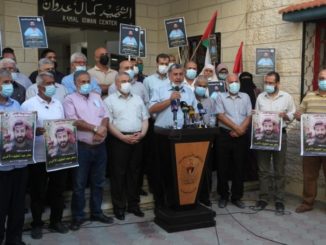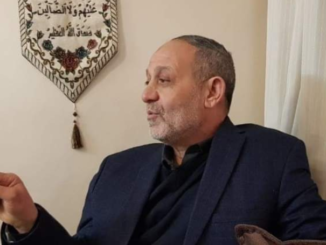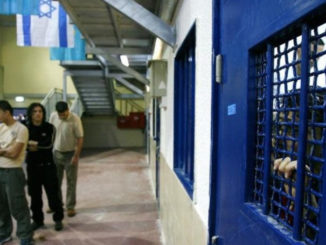
In 2016, a group of scholars and an Italian judge started a three-year research project on Israel’s law and practice of administrative detention in the West Bank. The main objective of the project was to critically assess the compatibility of the Israeli use of administrative detention against Palestinians with international law standards.
For this reason, they visited Israel and Palestine, where they had the possibility to meet with senior officers from NGOs protecting the fundamental rights of Palestinian prisoners.
In September 2016, they organized an international workshop in the UK town of Liverpool with the participation of scholars from several European universities and from Palestine, as well as representatives of Addameer, B’Tselem, and Defense for Children International.
In September 2019, the publication of the Report, coauthored by Dr. Peter Langford and Dr. Triestino Mariniello, completed the research project. The authors have presented the Report in several universities and institutions, including the European Parliament (Bruxelles) and the House of Commons (London).
This article, contributed by Dr. Triestino Mariniello to The Palestine Chronicle, is based on that report.
Administrative detention is the deprivation of liberty, for an indeterminate period, without criminal charge or trial. It entails significant interference with protections afforded to the individual by the norms of international law, at the stages of arrest, interrogation, judicial proceedings relating to the imposition, extension and review of an administrative detention order, and the length and conditions of detention.
The deprivation of liberty is accompanied by a number of elements that raise questions over the legitimacy, under international law, of a widespread and systematic recourse to that practice. Israeli Military Order 1651 authorizes the military commanders in the area to detain an individual for up to six months if they have “reasonable grounds to presume that the security of the area or public security require detention.”
The use of administrative detention is one of the Israeli (central) oppressive tools of the civilian population in the West Bank. Over the course of the belligerent occupation of the West Bank, Israel has availed itself of administrative detention to deprive thousands of Palestinians, including minors, of their liberty for varying, but generally prolonged, periods of time.
Israel makes continuous, widespread and systematic use of administrative detention against Palestinians. Figures show that, in contrast to international law, the use of administrative detention by Israel is not an exceptional measure.
On 5 November 1989, Israel held 1,794 Palestinians in administrative detention. B’Tselem has reported that Israel held more than 1000 Palestinians in administrative detention in 2003 and that since March 2002, “not a single month has gone by without Israel holding at least 1000 Palestinians in administrative detention”.
Ramzy Baroud's 'These Chains Will be Broken' offers readers a greater understanding that could not be possible earlier given the severely restricted environment that Palestinian detainees are faced withhttps://t.co/X6j62Dqbdm
— Rima Najjar (@rima123) April 16, 2020
From June 2002 until June 2003, Israel held a monthly average of 1063 administrative detainees, with a peak of 1140 administrative detainees in April 2003. In July 2016, there were approximately 750 administrative detainees in Israeli custody, including 3 Palestinian Legislative Council members, 2 females, and 8 children.
As of the end of 2018, 494 Palestinians, including two minors aged between 16 and 18 years old, were being held under administrative detention in Israel Prison Service facilities. Administrative detention is also frequently extended. From the beginning of 2015 to the end of July 2017, among 3,909 administrative detention orders, 2,441 (62.4%) were extensions of existing orders.
Although several states rely on preventive detention within the context of a state of emergency, Israel’s use of administrative detention against Palestinians constitutes one of the most problematic and questionable practices under international law.
In 2019, we have published an extensive research Report which provides a systematic and comprehensive analysis of how Israel’s state practice of administrative breaches several provisions under international humanitarian law and international human rights law.
The Report also indicates those crimes against humanity and war crimes that are potentially committed as a result of the alleged harm caused to individuals by the Israeli State practice of administrative detention.
Which are the main concerns arising from the Israeli authorities’ use of administrative detention in the West Bank? Administrative detention against Palestinians is characterized by broad grounds for arrest; the lack of information provided, at each stage of the initial detention process and subsequent judicial review and appeal, to the detainee or her/his legal representative regarding the reasons for detention; the use of severe techniques of interrogation; the use of secret evidence as to the basis for the judicial review and appeal; the resulting limitations upon the effective legal representation of the detainee and the absence of an effective review process before an impartial court or administrative body (including the extremely low percentage rate of judicial cancellations of detention orders); the absence of either a maximum cumulative period of administrative detention or the number of times an administrative detention order can be renewed; the unlawful transfer of the majority of detainees, from the Occupied Palestinian Territory (OTP) to the detention estate in Israel.
As said above, the grounds for administrative detention, the specific “reasons of regional or public security”, therefore, remain unknown to the detainee and/or legal representative at the outset, and commonly, for the duration of the proceedings. Proceedings take place before military courts which raise serious concern on their impartiality and independence.
According to the Israeli army, from August 2008 until July 2009, among 1678 applications submitted by the Military Commander, only 82 (5%) have been rejected by the military judge. Even the right to appeal is meaningless.
From 2000 until 2012, the Supreme Court accepted just one appeal, but the decision was suspended and no detainee was released. The members of the police or Israeli Security Agency (ISA) who undertook the initial interrogation do not attend the proceedings, and it is the military prosecutor who is usually the only source of information about the evidence submitted in administrative detention cases.
If the defense seeks to question the military prosecutor to elicit further information, he/she has the right not to answer questions and will normally respond that the information is ‘privileged evidence’, which cannot be disclosed. In the rare event that the prosecutor responds, it is normally considered to have the status of unsworn evidence.
The defense lawyer is, thus, not in the position to know what is contained in the security file; is not able to contest the veracity of the classified information presented to the court; and is not able to confront and cross-examine witnesses. It is very unusual for defense lawyers to call witnesses for the defense, and, in practice, the only evidence that is available relates to the good behavior of the detainee and his/her family life.
In addition, the hearing is held in camera and is, therefore, not open to the public. Administrative detention orders are written in Hebrew, a language that the majority of detainees cannot understand, and not translated into Arabic.
The capacity of Palestinian lawyers to represent detainees in the Israeli military and civil courts is dependent upon their residency, with Palestinian lawyers whose residency is either in the West Bank or in the Gaza Strip having restricted rights of representation compared with Palestinians with Jerusalem residency.
In regard to the stage of interrogation of detainees from the OPT, allegations continue to be reported of their routine subjection to treatment qualifying as torture or cruel, inhuman or degrading treatment or punishment in order to obtain confessions or other information. Personnel from the ISA frequently use various techniques, during interrogations, such as violent shaking, shackling detainees in painful positions, excessive use of blindfolds and handcuffs, sleep deprivation, solitary confinement, exposure to loud noises or to very cold or very hot temperatures for extended periods, prolonged denial of food and water, and denial of access to toilets, showers or change of clothes.
The Israeli Supreme Court has acknowledged, since the case of Public Committee Against Torture vs. State of Israel, that a number of these techniques were used in interrogations, and that there is a prima facie presumption of their prohibited character under Israeli domestic law. In addition, the subsequent cases of As’ad Abu Gosh et al. v the Attorney-General et al., in 2017, and, Tbeish et al. v. State attorney General et al., in 2018, indicate the continued use of many of these methods of interrogation against detainees from the OPT.
Moreover, individuals in administrative detention have restrictions placed upon their freedom to communicate with, and receive to visits from family members; this is partly a consequence of their incarceration in, and regular transfer between, facilities located outside the OPT. Conditions of detention remain substandard: detention centers are often not staffed with properly trained officers; there is excessive use of solitary confinement and isolation; medical care is poor; food is of poor quality, insufficient in amount and, at times, culturally or religiously inappropriate; there is insufficient individual living space, no cooling system, poor hygiene facilities and limited access to personal hygiene products.
Detainees are also prohibited from access to education. The imposition of administrative detention in the OPT involves the individual’s detention in detention facilities under the control of the Israeli Prison Service (IPS). Apart from Ofer Prison located in the OPT, the other facilities are in Israel.
Click to watch my latest webinar, hosted by the Washington Report on Middle East Affairs on the struggle and resilience of Palestinian prisoners. #PalestinianPrisonersDay.
Posted by Ramzy Baroud on Friday, April 17, 2020
In contrast to Article 49 of the Fourth Geneva Convention, Palestinian administrative detainees are regularly deported from the OTP to interrogation centers and prisons located in Israel. Upon arrest and detention, detainees are divided into three categories and this categorization reflects a differentiation with regard to the legal and procedural status of each category: (i) Israeli Jewish criminal prisoners; (ii) Palestinian criminal prisoners including those ones with Israeli citizenship or who have committed some specific crimes; and (iii) Palestinian political prisoners from the OPT (including West Bank, Gaza and East Jerusalem) and Palestinian political prisoners who hold Israeli citizenship.
The differentiation with regard to legal status and procedural requirements is exemplified by the following instances. There is a marked difference in the application of administrative orders in Israel and in the OPT. In Israel, the Israeli Emergency Powers Law (Detention) (1979) provides that a detainee must be brought before a judge within 48 hours and the detention order must be reviewed every three months.
In contrast, in the OPT, a detainee must be brought before a judge within 8 days, and the length of the administrative detention orders is for a maximum of a six-month period and can be indefinitely renewed. Palestinian political detainees in Israel (unlike Jewish prisoners from Israel) are not entitled to the use of a telephone and home visits; it is very difficult they receive early release, and they cannot receive family visits without being separated by barriers from family members. Israel applies international human rights law to settlers illegally residing in the OPT, but does not afford such rights and obligations to Palestinians.
The Israeli State practice of administrative detention is also used extensively against children in the OPT. In this regular and widespread recourse to administrative detention for juveniles, Israel is in breach of its obligations under the Convention on the Rights of the Child. The breach results from the absence of overarching juvenile justice policy in the OPT, in which deprivation of liberty is an exceptional measure, and the absence of the specific procedural and substantive protections required for juveniles subject to arrest, interrogation and detention as part of the Israeli State practice of administrative detention.
Upon arrest, whose grounds, as with adults, are generally vague and unspecific, Palestinian juveniles are regularly reported to be subjected to techniques of interrogation which are capable of constituting torture or other forms of ill-treatment; and the interrogation is conducted without the additional procedural requirements for juveniles. 98% of minors report they have been blindfolded and handcuffed, questioned without a lawyer or relative, not informed of the reasons for their arrest, subject to threats and verbal abuse.
At the end of the detention period, under Article 285(B), the military commander is authorized to renew the detention order for another period of up to six months, and no limit is imposed upon the process of renewal thus enabling it to be initiated indefinitely. For each instance of renewal of the detention order, the detainee is offered a new judicial review and further appeal.
The individual subject to an administrative detention order imposed in the OPT experiences a situation in which, apart from the knowledge of the length of the existing detention order and the initiation of judicial review proceedings in relation to any further extension, he or she has no further certainty as to the duration of the detention or the possibility of release.
As correctly observed by the UN Human Rights Council, the Israel State practice of administrative detention is in itself the infliction of an inhumane act as “the uncertainty that such measures imply for the detainee in the absence of any charges, known evidence or trial, as well as of any foreseeable detention period, may amount to ill-treatment”. To conclude, for decades, Palestinian prisoners have been suffering the most serious violations of their fundamental rights, amounting to war crimes and crimes against humanity.
The Report provides policy recommendations to UN bodies, European Union institutions and the International Criminal Court (ICC). In particular, it invites the ICC Prosecutor to investigate alleged crimes against humanity and war crimes committed by Israelis against Palestinian administrative detainees. Recently, the Prosecutor of the ICC has concluded a preliminary investigation into the Israel/Palestine situation.
Palestinians Face Torture in Israeli Administrative Detention
by Ramzy Baroud
RamzyBaroud #Israel #Palestine #Palestinianshttps://t.co/WnYXWKrnL4 pic.twitter.com/r9m7CL0tGe— Play the Man Podcast (@PlayTheManPod) October 10, 2019
However, it is surprising that this investigation does not include alleged war crimes and crimes against humanity committed by Israeli nationals against Palestinian prisoners. Thus far, Palestinian administrative detainees have been denied access to justice or any form of redress, both at the domestic and at the international level.
This denial of justice for the victims of serious violations of human rights also constitutes an encouragement for the perpetrators to commit new crimes given the long-standing impunity which has been granted internationally to Israel.
For these victims of the most serious crimes, the ICC could represent the only opportunity to access an impartial international forum and seek an effective remedy for the harm they have suffered within the context of the longest military occupation in modern times.
– Triestino Mariniello is Senior Lecturer in Law, Coordinator of the Research Unit in “International Justice and Human Rights”, Department of Law and Criminology, Edge Hill University, UK. He is a Member of the Legal Team Representing Gaza Victims before the International Criminal Court. He contributed this article to The Palestine Chronicle.







